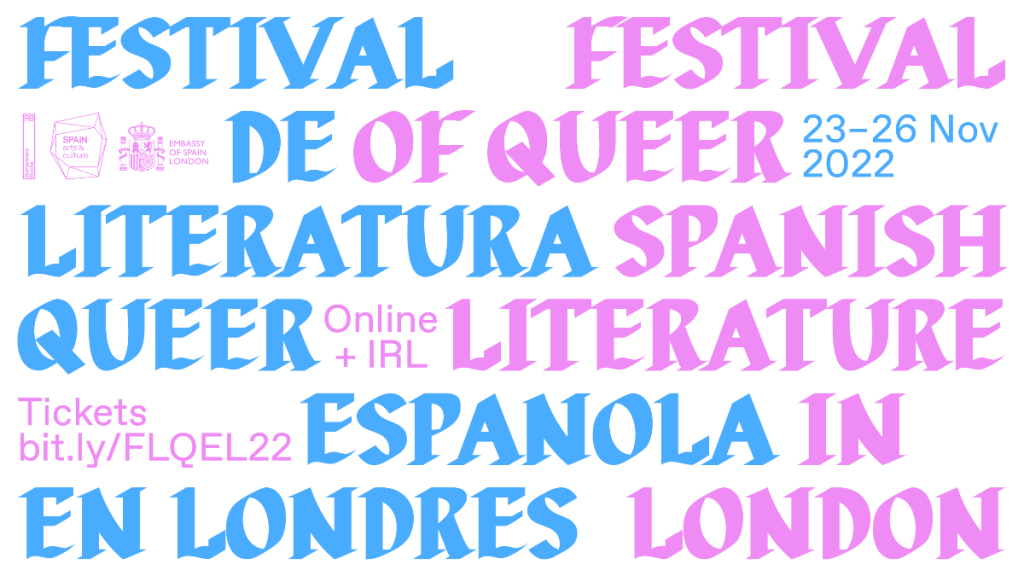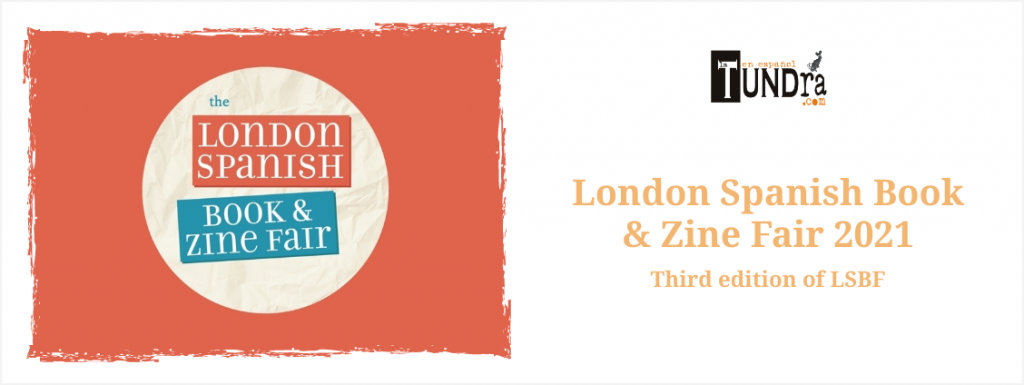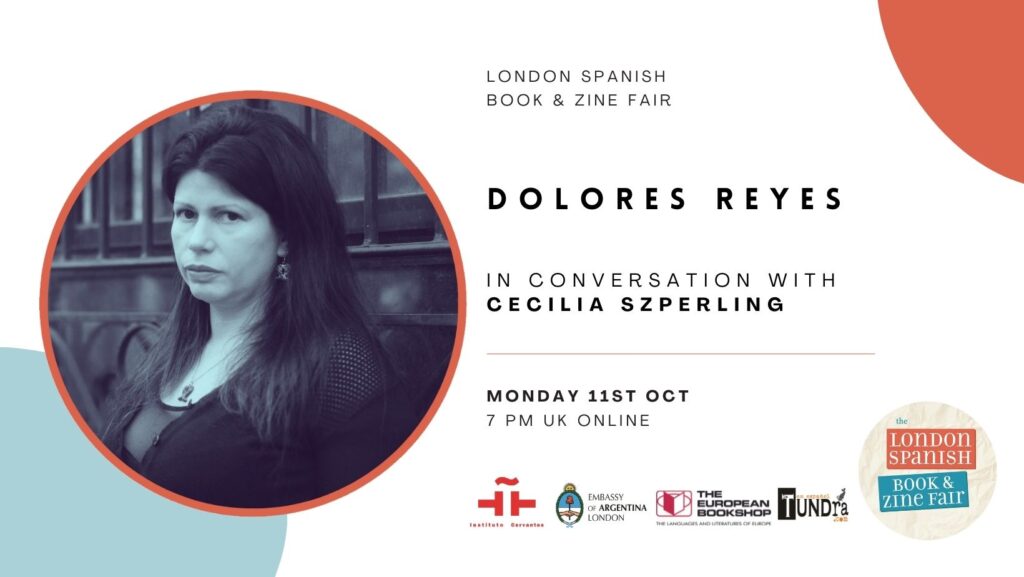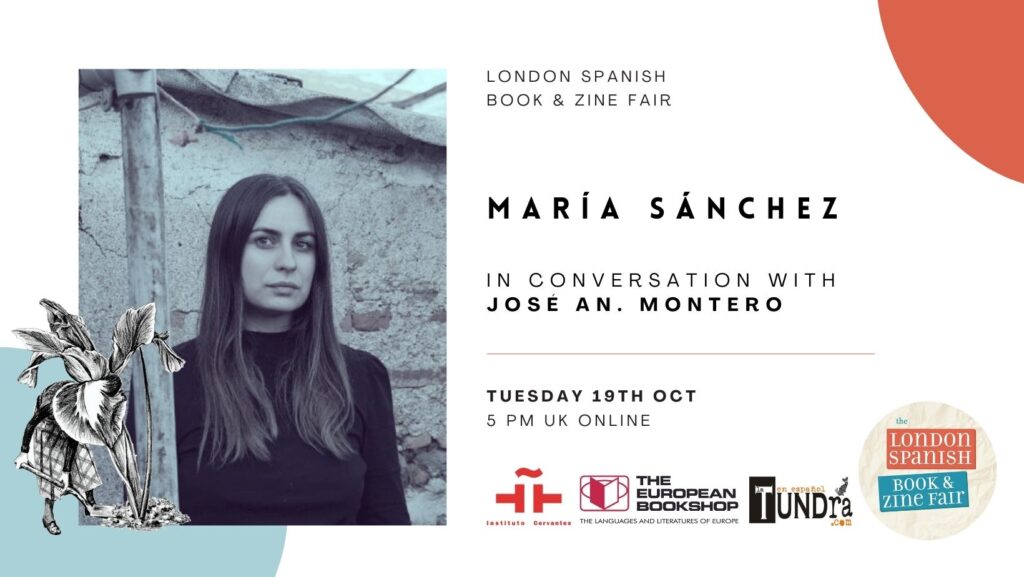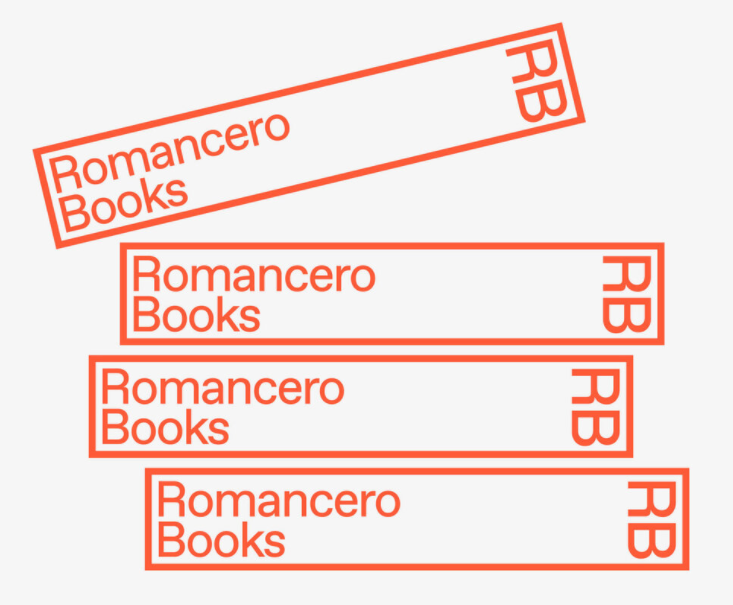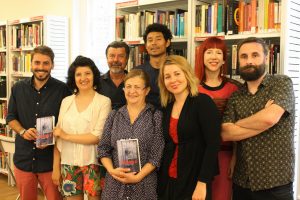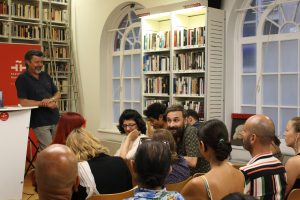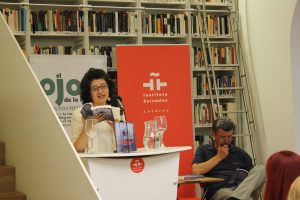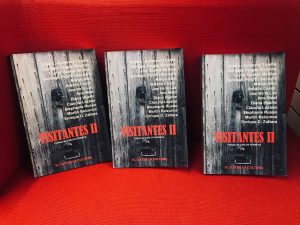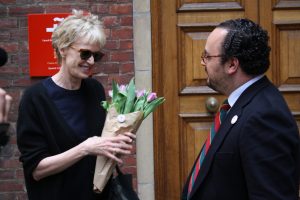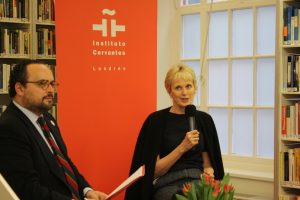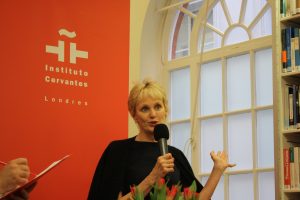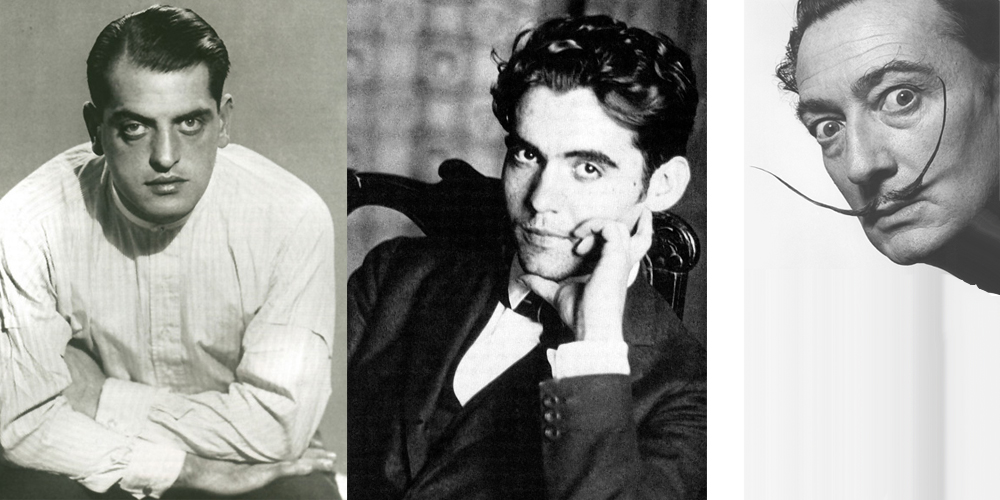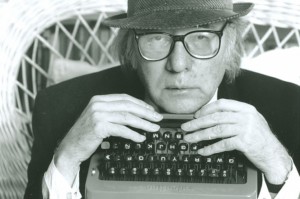II Festival of Queer Spanish Literature in London
We are pleased to share with you the programme of the II Festival of Queer Spanish Literature in London – FQSLL. Happening from Wednesday 23 to Saturday 26 November at various venues across London and online.
The II Edition of The Festival of Queer Spanish Literature in London – FQSLL is a meeting point for readers, writers and people interested in LGBTI+ culture in Spanish and in any other language spoken in Spain and Latin America.
The festival’s objectives are:
- Promote Spanish LGBTQI+ studies in the United Kingdom
- Share the latest queer literature written by Spanish and Latin American writers in the United Kingdom
- Remember the roots of queer writing and support the recovery of writers who were subject to censorship and suppression
- Launch some of the latest LGBTQI+ books published in Spain during the past year
- Support new voices in queer poetry and queer theatre
- Build connections between British readers and queer literature written in Spanish and Catalan by promoting their English-language translations
- Build relations between Spanish writers & editors and their British colleagues for potential future literature translations
London Spanish Book & Zine Fair 2021
| More than 60 authors and organizations will be represented at this year’s London Spanish Book and Zine Fair, including internationally acclaimed writer Argentinian Dolores Reyes and Spanish writer María Sánchez. Register on Eventbrite to assist to the digital talks and presentations on ZOOM taking place from 11st to 19th October 2021! London Spanish Book & Zine Fair 2021 is sponsored by Instituto Cervantes London, Embassy of Argentina in London and The European Bookshop With the support of Victorina Press and Friends of Alice Publishing. Organized by La Tundra Revista |
Dolores Reyes is one of the most relevant Argentine authors of the year.Her first novel Eartheater (Cometierra, Sigilo Editorial), immediately became an editorial and political case in Argentina. The novel it’s been already published in English (Harpers Collins), French (Éditions de l´Observatoire) and Italian (Solferino) and it’s also in process to be translated into Polish, Turkish, Greek, Danish, among other languages. It is dedicated to the memory of two teenagers victims of femicide, Melina Romero and Araceli Ramos.
Dolores Reyes in Conversation with Cecilia Szperling
Monday 11st OCT | 7 pm UK | In SPANISH | online
Writer and veterinarian María Sánchez works with indigenous breeds in danger of extinction. In Almáciga, her latest book, she has built a refuge-nursery of words that belong to a rural world that, as we look to the other side, we may lose. With Almáciga, as with Cuaderno de Campo and Tierra de Mujeres, an essay that vindicates the role of women in rural areas, María was on literary covers and podiums. In this conversation with José An. Montero we will accompany her on this journey of words outdoors through the countryside and rural areas of the Iberian Peninsula.
María Sánchez in Conversation with José An. Montero
Tuesday 19th OCT | 5 pm UK | In Spanish | online
LA ESPAÑOLA: Riveting Writing from Spain with Alice Banks. May: Contemporary Fiction
The end of April was a very exciting time for Spanish-language literature, with Granta naming their ‘best of young Spanish-language novelists’, each published in English translation in their latest issue: Granta 155: Best of Young Spanish-Language Novelists 2. This issue – the second of its kind – brings together twenty-five of the best young voices from thirteen different Spanish speaking countries. I’m keen to get my hands on a copy and see whether Granta has discovered any new literary gems! This announcement got me thinking: who would be on my current ‘best-of’ list? Who are the contemporary Spanish writers that I’m reading and enjoying at the moment?
Read more at the European Literature Network’s website
London opens the door to literature in Spanish language
Instituto Cervantes in London welcomes the presentation of a book celebrating twelve Spanish and Latin American authors living in the British capital.
Twelve Spanish-language authors from Argentina, Bolivia, Uruguay, Mexico, Nicaragua, Spain and Ecuador will speak today at 7pm at the London headquarters of Instituto Cervantes. All the writers now live and work in London, and their new book, Visitors II was written after attending the creative writing workshop, El Ojo de la Cultura Hispanoamericana (The Eye of Hispanic American Culture).
«London is a literary and creativity capital in Spanish because of the number of Spanish speakers who create in it,» says Ignacio Peyró, director of the Cervantes Institute in London, who highlights the Latin American vocation of the centre.
The twelve Spanish and Latin American authors are: José Luis Gutiérrez Trueba, Denisse Vargas Bolaños, Lester Gómez Medina, Santiago Peluffo Soneyra, Marijo Alba, Natalia Casali, Jael de la Luz, Ana Vidal, Diana Huarte, Claudia Lozano, Stephanie Russo and Martín Belzunce, coordinated by the Argentine writer Enrique D. Zattara.
All of them will talk about their work and their experience after attending the writing workshop that Zattara started in September 2015 and through which thirty writers have attended both face to face or online.
The Eye of Hispanic American Culture, ZTR Radio and Instituto Cervantes in London have been collaborating together since October 2017 in the “Authors in search of reader” cycle, aimed at spreading the work of Spanish-American writers still little known in this country among the British readers.
Writing workshops to improve stories
Zattara highlights the role of writing workshops to help writers, through the development of techniques and resources to improve the story and going through what will work or not. In addition, he explains how they disassemble the stories and resources used by writers such as the Argentine Jorge Luis Borges.
“Ricardo Piglia said that the first writings were particularly interesting because they were portrayed in the search for a style and the commitment to a way in which to think about literature”, says writer Carlos Fonseca, author of the prologue in this book. «The beauty of a book like this falls, then, on that style and form are thought collectively.»
In the case of the writer Lester Gómez Medina, a Costa Rican of Nicaraguan origin, four of his short stories are included. In them, he gathers his childhood experiences and how they impact on adult life. Gómez Medina highlights the role of the workshops as a speaker of the Spanish language in London, as well as to consolidate the writing and create a link with other writers to whom he already calls friends.
On the other hand, Diana Huarte, Argentine singer of electronic music of the group called Shh, arrived at the writing workshop two years ago after a health problem and eager to develop her creativity. In addition, the Cantabrian José Luis Gutiérrez Trueba joins the project with his stories, inspired by ideas that he takes from the street, news he is reading throughout the day, reflections of the current era and the impact of social networks and Brexit.
A project to spread to Spanish-speaking creators
The Eye of Hispanic American Culture in London is a multimedia cultural project that aims to communicate and disseminate with Spanish-speaking artistic creators worldwide. They develop their motives through various formats, such as radio culture, through ZTR radio podcasts in which they carry out exclusively cultural programming in Spanish and English, which is also broadcast live in collaboration with ExraRadio1 of London.
In addition, they make cycles, readings and conferences for the dissemination and knowledge of Hispanic-American artists, in Spanish and English. These projects are both lone-ventures as well as in collaboration with institutions such as the Cervantes Institute, various Latin American Embassies, and some universities. They also organise public shows where they stage encounters of artistic disciplines such as poetry, music and dance, theater, cinema for the audience.
Siri Hustvedt, the most feminist, ethical and Dickensian writer is awarded Princess of Asturias Award for Literature
American writer Siri Hustvedt, recipient of the Princess of Asturias Award for Literature 2019, said that the recognition was «a mixture of gratitude, surprise and happiness» at a press conference held at the Cervantes Institute in London, a city where ahe is promoting her most recent novel.
Hustvedt (Minnesota, United States, 1955) began the press conference by mentioning her father, who said that «grace is not something you deserve or that you have necessarily earned. The correct answer to grace is gratitude.»
The Jury for the Princess of Asturias Award for Literature 2019, meeting in Oviedo, Spain, said that Hustvedt’s work is one of the most ambitious on today’s literary scene. Employing a feminist perspective, she addresses a variety of facets that sketch a convulsive, disconcerting present.
Translated into more than thirty languages, Hustvedt is a scholar and intellectual who addresses the fundamental issues of contemporary ethics and epistemology. As well as being known for her feminist militancy, her work has contributed to interdisciplinary dialogue between the sciences and the humanities. She has published essays and articles in academic and scientific journals, including Contemporary Psychoanalysis, Seizure: European Neuropsychoanalysis and Clinical Neurophysiology.
The writer takes the baton from recent award winners, such as Fred Vargas, Adam Zagajewski or Richard Ford. Hustvedt confirmed that she will attend the award ceremony of the Princess of Asturias Award at the Campoamor Theater in Oviedo this autumn.
In her speech at the Instituto Cervantes in London, Hustvedt highlighted the role and need of feminism over the centuries, quoting the example of the text against misogyny written by Christine de Pizan in the 14th century. «The waves of feminism reappear, I think sometimes they do in connection with this clash we see with populism, deeply present in the United States and also in Spain, as we have been seen in the past elections, as well as in Germany and the East of Europe».
For Hustvedt, it is clear that feminism is needed because «history is not over» and also because for her it is a form of humanism. Furthermore she said «women, people who do not identify as either men or women, feel liberated with the ideas of feminism.»
«It is a privilege to have hosted such a great writer on one of the most important days of her career. The Princess of Asturias Award is one of the greatest literary awards in the world and we are delighted to have a key writer in the contemporary scene with us,”, said Ignacio Peyró, director of the Instituto Cervantes in London.
Hustvedt will travel to Manchester in the coming days, to Bath, and to Hay’s literary festival. She recalled the figure of the British writer Charles Dickens, on whom she wrote her doctoral thesis at university. «My passion for Dickens goes back many years before, when I was 13 and I read David Copperfield. It was that novel that made me read others. Dickens has a very deep place in my life, but it even goes back to my Norwegian grandmother, who read Charles Dickens in Norwegian over and over again. He was her favourite writer,” she admitted.
Mesa redonda – Buñuel, Lorca, Dalí: cultura, biografía y legado / Open table discussion – Buñuel, Lorca, Dalí: Culture, Biography and Legacy
¿Cómo construir una vida por medio de una película? ¿Cómo influyó el sistema de valores de la Residencia de Estudiantes de Madrid -donde vivieran Luis Buñuel, Federico García Lorca y Salvador Dalí a principios de la década de 1920- en el trabajo de los tres artistas? Para sellar la temporada cinematográfica del ICA «Luis Buñuel: estética de lo irracional», reunimos a un grupo de expertos en cultura con el fin de analizar la relación particular de Lorca, Buñuel y Dalí, y la forma de la que artistas y directores de cine han intentado captar tanto la estética revolucionaria de los tres artistas como su valiosísimo legado cultural.
El actor Nickolas Grace (quien diera vida a Lorca en el largometraje de Bardem en 1995, «Lorca, muerte de un poeta»), los directores Mike Dibb (El espíritu de Lorca, BBC Arena 1986; La fama y humillación de de Salvador Dalí, BBC Arena 1996) y Pablo Romero (Universidad de Roahampton, actualmente inmerso en un nuevo proyecto sobre Las Hurdes de Buñuel junto con Dibb), y la académica y traductora Sarah Wright (Royal Holloway, University of London), se reúnen con María Delgado (Royal Central School of Speech and Drama, University of London) para hablar de la cultura, biografía y legado de Buñuel, Dalí y Lorca.
Dónde: Instituto Cervantes de Londres – 102 Eaton Square, London SW1W 9AN
Cuándo: miércoles 2 de diciembre 2015, 18:30h
______________________________________
What does it mean to construct a life through film? How did the unique ethos of Madrid’s Residencia de Estudiantes where Luis Buñuel, Federico García Lorca and Salvador Dalí all lived during the early 1920s influence the creative work of all three artists? To mark the ICA’s ‘Luis Buñuel: Aesthetics of the Irrational’ film season, this panel brings together a group of different cultural critics to examine the unique relationships between Lorca, Buñuel and Dalí, and the ways in which artists and filmmakers have sought to ‘capture’ both the ground-breaking aesthetics of the three artists and their unique cultural legacy.
Actor Nickolas Grace (who played Lorca in Bardem’s 1995 film Lorca, muerte de un poeta), filmmakers Mike Dibb (The Spirit of Lorca, BBC Arena 1986; The Fame and Shame of Salvador Dalí, BBC Arena 1996) and Pablo Romero (University of Roehampton, currently working on a new film on Buñuel’s Las Hurdes with Dibb), and academic and translator Sarah Wright (Royal Holloway, University of London) join Maria Delgado (Royal Central School of Speech and Drama, University of London) to discuss the culture, biography and legacy of Buñuel, Dalí and Lorca.
Where: Instituto Cervantes London – 102 Eaton Square, London SW1W 9AN
When: Wednesday 2 December 2015, 6.30 pm
Serie Ganadores Premio Cervantes: Francisco Umbral / Cervantes Prize Winners Series: Francisco Umbral
La cuarta serie de ponencias sobre los ganadores del Premio Cervantes se centra en una de las voces más incisivas de la literatura y periodismo contemporáneos en España: Francisco Umbral.
La conferencia, impartida por el Dr. Guillermo Lain Corona (profesor asociado de lengua y literatura española en University College London), te permitirá conocer otras facetas de este autor, figura clave en el ámbito sociopolítico español.
Lunes 14 septiembre, 18.30h
Instituto Cervantes de Londres
102 Eaton Square, London SW1W 9AN
La asistencia es gratuita, pero las plazas son muy limitadas. Reserva la tuya hoy enviando un correo electrónico a emb.londres.ofc@maec.es o a reservas.londres@cervantes.es, o bien llamando por teléfono a 0207 201 0752.
________________________________________
The fourth Cervantes Prize Winners series focuses on one of the most incisive voices of contemporary Spanish literature and journalism: Francisco Umbral.
The talk, given by Dr. Guillermo Lain Corona (teaching fellow in Spanish language and literature at University College London), will uncover other facets of this key figure in the Spanish socio-political scene.
Monday 14 September, 6.30 pm
Instituto Cervantes London
102 Eaton Square, London SW1W 9AN
Admission is free, but seats are very limited. Reserve yours today by emailing either
emb.londres.ofc@maec.es or reservas.londres@cervantes.es, or calling 0207 201 0752.
Premios literarios
 El pasado 24 de Noviembre la escritora Ana María Matute recibió el premio Cervantes, el galardón más prestigioso de las letras en lengua española. Se trata de la tercera mujer distinguida con este galardón en los 35 años de vida del premio. La autora, de 85 años, ha sido galardonada por su obra compuesta por 12 novelas y varios volúmenes de cuentos, ahora reunidos en La puerta de la Luna, desde los primeros textos de 1947 hasta 1998.
El pasado 24 de Noviembre la escritora Ana María Matute recibió el premio Cervantes, el galardón más prestigioso de las letras en lengua española. Se trata de la tercera mujer distinguida con este galardón en los 35 años de vida del premio. La autora, de 85 años, ha sido galardonada por su obra compuesta por 12 novelas y varios volúmenes de cuentos, ahora reunidos en La puerta de la Luna, desde los primeros textos de 1947 hasta 1998.
________________________________________________________________________________________
Por otra parte, el pasado 7 de Octubre el escritor hispano-peruano Mario Vargas Llosa fue galardonado con el premio Nobel de literatura, el premio más prestigioso de las letras universales. El escritor ha volado hoy a Estocolmo donde el próximo 10 de Diciembre recibirá el premio. El diario El País recoge hoy en sus páginas un sumario de la entrevista que ha concedido a los periodistas a su llegada a la capital. El artículo se encuentra disponible a través de la siguiente dirección web:
